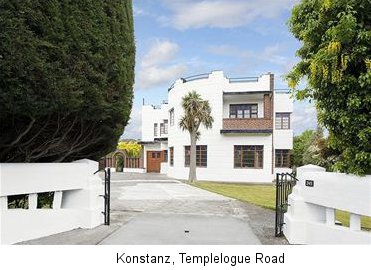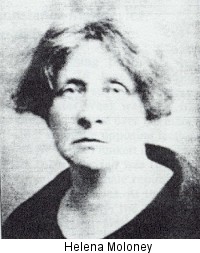Journal Volume 4 2004
Major Hermann Goertz and German World War 2 Intelligence Gathering in Ireland (continued/4)
Goertz Avoids Capture
Acting on information received from one of the maids in the Held household, who was concerned about some of the  strange and suspicious activities going on, the Garda raided Konstanzon May 24th 1940. Goertz heard the squeal of the Garda raiding party's cars pulling up outside and escaped out a back door as the raiding party entered through the front door, jumped over a back wall and sheltered in a neighbouring garden for a number of hours. The Garda raid uncovered a great deal of incriminating information during the search of Held's house, including notes covering the landing of arms in Ireland by submarines, a tent, coded messages, a radio transmitter, Goertz's World War 1 decorations, his cap, details of the type of information to be collected in Ireland and a suit of clothes from Switzers, whose records showed that these had been purchased by lseult Stuart on May 9th. This purchase had aroused the curiosity of the staff in Switzers at that time who wondered why she needed men's clothes costing more than £20 especially when he husband was in Germany. A safe in the house could not be opened and when Held could not produce a key for it, the safe was broken open and US $20,000 in notes found inside it. Held spun a story about how the material belonged to a Heinrich Brandy but the Garda did not believe this story and Held subsequently appeared before the Special Criminal Court, charged with a number of offences, and, after conviction, was sentenced to 5 years imprisonment.
strange and suspicious activities going on, the Garda raided Konstanzon May 24th 1940. Goertz heard the squeal of the Garda raiding party's cars pulling up outside and escaped out a back door as the raiding party entered through the front door, jumped over a back wall and sheltered in a neighbouring garden for a number of hours. The Garda raid uncovered a great deal of incriminating information during the search of Held's house, including notes covering the landing of arms in Ireland by submarines, a tent, coded messages, a radio transmitter, Goertz's World War 1 decorations, his cap, details of the type of information to be collected in Ireland and a suit of clothes from Switzers, whose records showed that these had been purchased by lseult Stuart on May 9th. This purchase had aroused the curiosity of the staff in Switzers at that time who wondered why she needed men's clothes costing more than £20 especially when he husband was in Germany. A safe in the house could not be opened and when Held could not produce a key for it, the safe was broken open and US $20,000 in notes found inside it. Held spun a story about how the material belonged to a Heinrich Brandy but the Garda did not believe this story and Held subsequently appeared before the Special Criminal Court, charged with a number of offences, and, after conviction, was sentenced to 5 years imprisonment.
 When all the activity in Konstanzhad died down, Goertz left the neighbouring garden where he had been sheltering undetected for several hours and returned to Iseult Stuart's house in Laragh only to discover on arrival that she too had been arrested. When brought before the Special Criminal Court, Iseult Stuart was able to give some harmless explanations sufficient to result in her acquittal. Luckily for Goertz, Helena Moloney, a friend of Iseult Stuart, and a leading member of the Women Workers Union, was in her house when he arrived. She took matters in hand and arranged for him to stay in a number of safe houses where those sheltering him were Republican sympathisers, after which he began a period of living in rented accommodation. These included a house in Charlemont Avenue, Dun Laoghaire, owned by a Miss Coffey, where Goertz was known as a Mr. Robinson using the cover as a commercial traveller to explain his absences during which he claimed he was visiting customers. In reality Goertz was in a house in Dalkey where for a time a radio transmitter was installed with Goertz being brought to and from the house in Dalkey by car.
When all the activity in Konstanzhad died down, Goertz left the neighbouring garden where he had been sheltering undetected for several hours and returned to Iseult Stuart's house in Laragh only to discover on arrival that she too had been arrested. When brought before the Special Criminal Court, Iseult Stuart was able to give some harmless explanations sufficient to result in her acquittal. Luckily for Goertz, Helena Moloney, a friend of Iseult Stuart, and a leading member of the Women Workers Union, was in her house when he arrived. She took matters in hand and arranged for him to stay in a number of safe houses where those sheltering him were Republican sympathisers, after which he began a period of living in rented accommodation. These included a house in Charlemont Avenue, Dun Laoghaire, owned by a Miss Coffey, where Goertz was known as a Mr. Robinson using the cover as a commercial traveller to explain his absences during which he claimed he was visiting customers. In reality Goertz was in a house in Dalkey where for a time a radio transmitter was installed with Goertz being brought to and from the house in Dalkey by car.
Secret Meetings with Irish Army Officer
One visitor to the Dalkey house was Major General Hugo MacNeill, commander of the 2nd Division of the Irish Army, who was concerned to know if Germany would come to Ireland's assistance if the British forces in Northern Ireland invaded. MacNeill was treading on very dangerous grounds and was engaging in a course of action which could have ended in a court martial if the Government had become aware of the true nature of his dealings. MacNeill was one of a number of high-ranking army officers known to Irish military intelligence for their anti-British views, which declined cover to him during these discussions. While in Dalkey, Goertz received medical treatment from a medical practitioner and met several politicians and it appears that while his presence was know to several well placed people, the authorities took no action, though it is possible that he may have been under surveillance at this time to see who his contacts were.
When Dr Eduard Hempel, the German Minister to Ireland, became aware of what was going on, he indicated to Berlin that Taoiseach Eamon de Valera would have nothing to do with what MacNeill was proposing and was reluctant to meet Goertz in case the Irish Government became aware of any contacts or meetings between them. Hempel was also afraid that Goertz was competing with him for control of German policy in Ireland. But Hempel also realised that the Irish feared a British invasion from Northern Ireland to seize ports along the South and West coast and that the Irish Army needed support.
Goertz took the initiative by proposing a meeting with Hempel, who agreed to this and to his credit organised a novel way for the two men to meet by arranging a party for members ofthe German community in his Monkstown residence. Goertz was invited to it and attended it unnoticed by the Special Branch outside or by the large attendance inside. Goertz called at Hempel's residence in the guise ofone of the guests and when he gave a coded greeting at the door, was ushered into a study away from the gaze ofthe other guests. From time to time, Hempel excused himself from his guests and held brief conversations with Goertz in this study. Hempel was impressed by Goertz's manners and sharpness ofmind and was extremely delighted when Goertz indicated to him that he wished to return to Germany to submit his full report on the situation in Ireland. This suited Hempel as he considered the activities ofGoertz as a threat to his diplomatic mission in Ireland and that Goertz's contacts and intrigues with Major-General MacNeill posed threats to Irish neutrality. Hempel was also concerned that the Allies might use the presence and activities of Goertz as a German espionage operator in Ireland as a propaganda tool to force Taoiseach Eamon de Valera to abandon his stance ofneutrality and enter World War 2 on the Allies side.
One can appreciate Hempel's situation - his mission was to keep Ireland from joining with the Allies; to prevent the country giving direct assistance to the Allies; to ensure that the country remained neutral; and finally if at all possible to try and get Ireland to side with Germany, however unlikely this might be. Hempel was not the first diplomat to be kept in the dark over what intelligence services were engaged in with the usual problems that these activities can cause for diplomats when they come to light because they have not been briefed about such activities.


